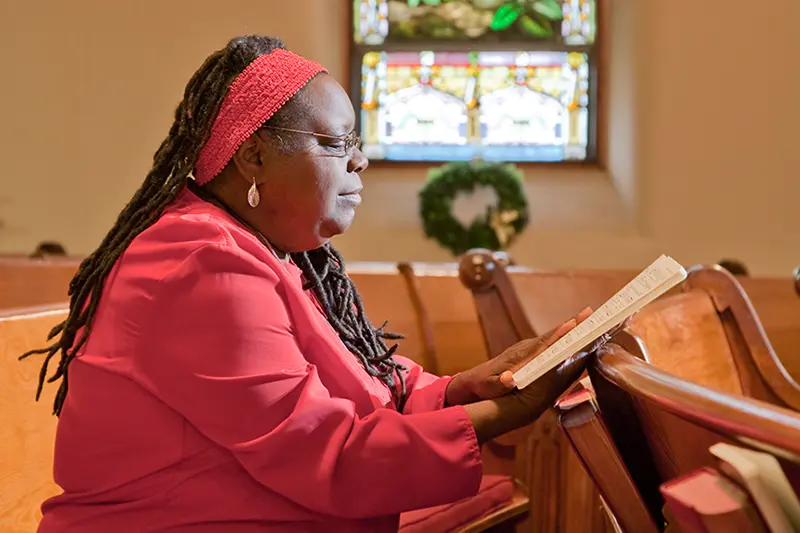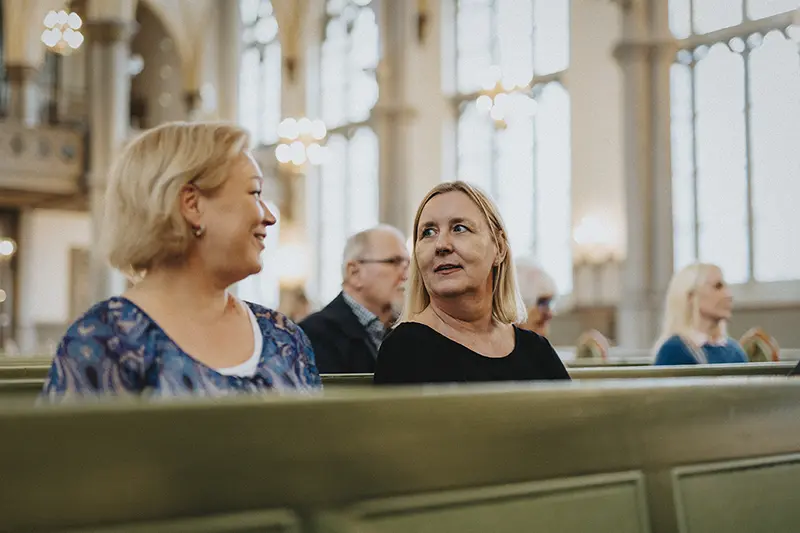Spirituality, Religion, and Faith

My faith and my family.
Female, 53, in response to being asked what contributes to your well-being
- 80% of adults ages 50-80 say their spiritual beliefs are important in their lives (50% very important, 30% somewhat important)
- 71% of adults ages 50-80 say religious beliefs are important in their lives (45% very important, 26% somewhat important)
- Over three-quarters of adults in their 50s to about nine in 10 adults in their 90s are religiously affiliated in the United States.
Source: Spiritual/religious belief importance: Marks A, Brazier LJ, Singer D, Kirch M, Solway E, Roberts S, Smith E, Hutchens L, Malani P, Kullgren J. National Poll on Healthy Aging: Religious and Spiritual Beliefs and Health Care, December 2022. Religious affiliation: Pew Research Center, September 2022, “Modeling the Future of Religion in America.”
Older adults commonly report spirituality or religion and faith as integral to their well-being. Spirituality and/or religion can offer meaning in life, coping mechanisms (e.g., trusting in God regarding life’s problems), a hopeful outlook, social support in community, and social activity including volunteerism/giving back. For religion, studies have shown correlations with improved physical and mental health, but it is undetermined whether this relationship is causal. It is also unclear if religion itself would be the reason for improved well-being or if the factors that accompany it (such as social engagement) are responsible.1 Nevertheless, the importance of spirituality, religion and faith in the lives of people 50 and older is palpable in numerous research studies. Topics related to this include:
Importance of Spirituality/Religion
Most adults ages 50–80 (84%) say that religious and/or spiritual beliefs are important to them.
Spiritual beliefs are somewhat more likely to be considered important than religious beliefs, likely indicative of the encompassing nature of spirituality. Specifically, 80% of those ages 50-80 say their spiritual beliefs are important in their lives (50% very important, 30% somewhat important) while seven in ten (71%) say religious beliefs are important (45% very important, 26% somewhat important).3
Adults 50 and older who are more likely to assign importance to both religion and spirituality in their life include:
- Black/African American adults
- Women
- Those with a household income of less than $100K
- Those living in the Midwest or South
The importance of spirituality is somewhat more consistent than that of religion when looking across demographic groups.
Spirituality maintains an elevated level of importance across age and education levels, however younger adults and adults with higher levels of education are somewhat less likely to say religious beliefs are important in their life.
Adults ages 50-64 are 11 percentage points more likely to say spiritual beliefs are important than religious beliefs; this gap narrows to five percentage points for those 65-plus. Those with postgraduate study are 17 percentage points more likely to say spiritual beliefs are important than religious beliefs; this gap narrows to 2 percentage points for those with a high school degree or less. This could indicate that, in general for older individuals and those with lower levels of education, there is a stronger relationship between spirituality and religion than for younger individuals and those with higher levels of education.5
Older adults report the importance of spirituality and religion in their life.
Percent of adults ages 50-80 who say religious beliefs or spiritual beliefs are somewhat or very important to them in their life

Among those with important religious or spiritual beliefs, 63% report belonging to a community or organization that shares those beliefs. Further, many adults ages 50-80 report that their religious beliefs (39%) or spiritual beliefs (46%) have become more important as they have gotten older.6
Religious Affiliation
Religion and spirituality remain important to older adults, although Americans overall are becoming less religiously affiliated.
While only around one in ten of those 80 and older are religiously unaffiliated, around two in ten of those in their 50s are. According to Pew Research Center, “the change in America’s religious composition is largely the result of large numbers of adults switching out of the religion in which they were raised to become religiously unaffiliated.”7
Only 1 in ten of those 80 and older are religiously unaffiliated, compared to 2 in ten of those in their 50s.
Estimated percent of Americans in each group, by age range
Key Takeaways
-
Religious and spiritual beliefs are important to most older adults, and many report their importance growing as they age. Older adults find community with those who share their beliefs.
-
Parsing out spirituality and religion, adults 50 and older are more likely to place importance on spiritual beliefs than religious beliefs, likely due to the expansive, broad nature of spirituality. Spirituality and religion are seen in a more interconnected way by adults 65 and older as well as those 50 and older with lower levels of education.
-
Religion and spirituality have outsized significance for certain groups like Black adults. There is a deep, generation-spanning history that explains the importance of religion to the Black community, shaping key cultural traits like optimism and perseverance, as well as serving as a source for support and solace.
Sources
- Daniel Kaplan. 2019. “Religion and Spirituality in Older Adults.” Merck Manuals Professional Edition. Merck Manuals. 2019.
- “Defining Religion and Spirituality.” n.d. Bowling Green State University; Anandarajah, G., and E. Hight. 2001. “Spirituality and Medical Practice: Using the HOPE Questions as a Practical Tool for Spiritual Assessment.” American Family Physician 63 (1): 81–89.
- Marks A, Brazier LJ, Singer D, Kirch M, Solway E, Roberts S, Smith E, Hutchens L, Malani P, Kullgren J. National Poll on Healthy Aging: Religious and Spiritual Beliefs and Health Care, December 2022. Study conducted in English.
- Collage Group, “Multicultural Health and Wellness Study” (November 2023). (Not publicly available. Contact Collage Group for details.)
- Marks et al. National Poll on Healthy Aging: Religious and Spiritual Beliefs and Health Care.
- Marks et al. National Poll on Healthy Aging: Religious and Spiritual Beliefs and Health Care.
- Pew Research Center, September, 2022, “Modeling the Future of Religion in America: 1. How U.S. religious composition has changed in recent decades.”
- Pew Research Center. 2022. “Modeling the Future of Religion in America.” Pew Research Center’s Religion & Public Life Project. September 13, 2022.